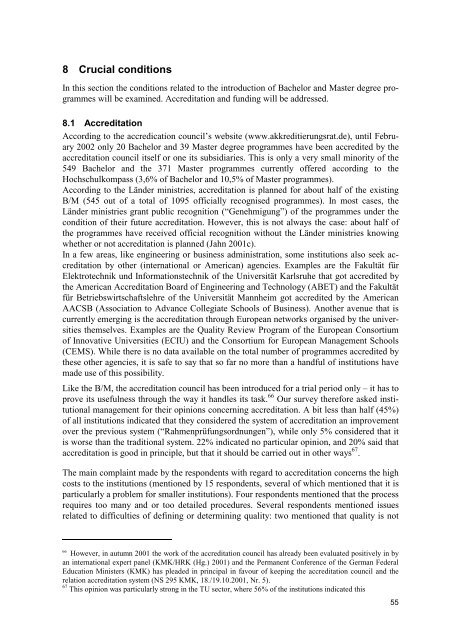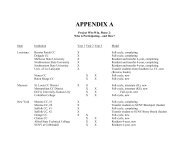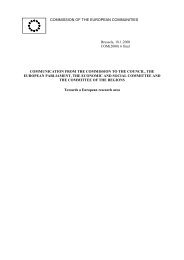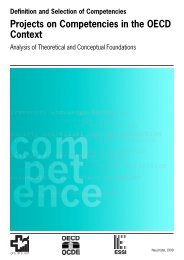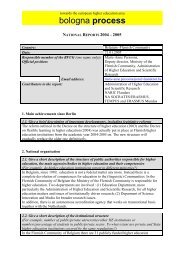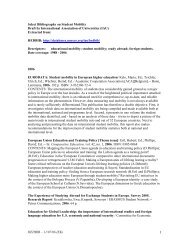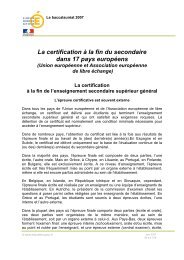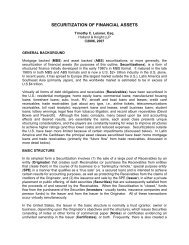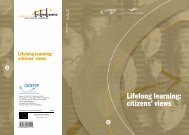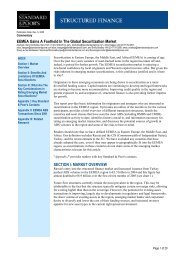and Master Programmes in German Higher Education Institutions
and Master Programmes in German Higher Education Institutions
and Master Programmes in German Higher Education Institutions
- No tags were found...
You also want an ePaper? Increase the reach of your titles
YUMPU automatically turns print PDFs into web optimized ePapers that Google loves.
8 Crucial conditionsIn this section the conditions related to the <strong>in</strong>troduction of Bachelor <strong>and</strong> <strong>Master</strong> degree programmeswill be exam<strong>in</strong>ed. Accreditation <strong>and</strong> fund<strong>in</strong>g will be addressed.8.1 AccreditationAccord<strong>in</strong>g to the accredication council’s website (www.akkreditierungsrat.de), until February2002 only 20 Bachelor <strong>and</strong> 39 <strong>Master</strong> degree programmes have been accredited by theaccreditation council itself or one its subsidiaries. This is only a very small m<strong>in</strong>ority of the549 Bachelor <strong>and</strong> the 371 <strong>Master</strong> programmes currently offered accord<strong>in</strong>g to theHochschulkompass (3,6% of Bachelor <strong>and</strong> 10,5% of <strong>Master</strong> programmes).Accord<strong>in</strong>g to the Länder m<strong>in</strong>istries, accreditation is planned for about half of the exist<strong>in</strong>gB/M (545 out of a total of 1095 officially recognised programmes). In most cases, theLänder m<strong>in</strong>istries grant public recognition (“Genehmigung”) of the programmes under thecondition of their future accreditation. However, this is not always the case: about half ofthe programmes have received official recognition without the Länder m<strong>in</strong>istries know<strong>in</strong>gwhether or not accreditation is planned (Jahn 2001c).In a few areas, like eng<strong>in</strong>eer<strong>in</strong>g or bus<strong>in</strong>ess adm<strong>in</strong>istration, some <strong>in</strong>stitutions also seek accreditationby other (<strong>in</strong>ternational or American) agencies. Examples are the Fakultät fürElektrotechnik und Informationstechnik of the Universität Karlsruhe that got accredited bythe American Accreditation Board of Eng<strong>in</strong>eer<strong>in</strong>g <strong>and</strong> Technology (ABET) <strong>and</strong> the Fakultätfür Betriebswirtschaftslehre of the Universität Mannheim got accredited by the AmericanAACSB (Association to Advance Collegiate Schools of Bus<strong>in</strong>ess). Another avenue that iscurrently emerg<strong>in</strong>g is the accreditation through European networks organised by the universitiesthemselves. Examples are the Quality Review Program of the European Consortiumof Innovative Universities (ECIU) <strong>and</strong> the Consortium for European Management Schools(CEMS). While there is no data available on the total number of programmes accredited bythese other agencies, it is safe to say that so far no more than a h<strong>and</strong>ful of <strong>in</strong>stitutions havemade use of this possibility.Like the B/M, the accreditation council has been <strong>in</strong>troduced for a trial period only – it has toprove its usefulness through the way it h<strong>and</strong>les its task. 66 Our survey therefore asked <strong>in</strong>stitutionalmanagement for their op<strong>in</strong>ions concern<strong>in</strong>g accreditation. A bit less than half (45%)of all <strong>in</strong>stitutions <strong>in</strong>dicated that they considered the system of accreditation an improvementover the previous system (“Rahmenprüfungsordnungen”), while only 5% considered that itis worse than the traditional system. 22% <strong>in</strong>dicated no particular op<strong>in</strong>ion, <strong>and</strong> 20% said thataccreditation is good <strong>in</strong> pr<strong>in</strong>ciple, but that it should be carried out <strong>in</strong> other ways 67 .The ma<strong>in</strong> compla<strong>in</strong>t made by the respondents with regard to accreditation concerns the highcosts to the <strong>in</strong>stitutions (mentioned by 15 respondents, several of which mentioned that it isparticularly a problem for smaller <strong>in</strong>stitutions). Four respondents mentioned that the processrequires too many <strong>and</strong> or too detailed procedures. Several respondents mentioned issuesrelated to difficulties of def<strong>in</strong><strong>in</strong>g or determ<strong>in</strong><strong>in</strong>g quality: two mentioned that quality is not66However, <strong>in</strong> autumn 2001 the work of the accreditation council has already been evaluated positively <strong>in</strong> byan <strong>in</strong>ternational expert panel (KMK/HRK (Hg.) 2001) <strong>and</strong> the Permanent Conference of the <strong>German</strong> Federal<strong>Education</strong> M<strong>in</strong>isters (KMK) has pleaded <strong>in</strong> pr<strong>in</strong>cipal <strong>in</strong> favour of keep<strong>in</strong>g the accreditation council <strong>and</strong> therelation accreditation system (NS 295 KMK, 18./19.10.2001, Nr. 5).67 This op<strong>in</strong>ion was particularly strong <strong>in</strong> the TU sector, where 56% of the <strong>in</strong>stitutions <strong>in</strong>dicated this55


